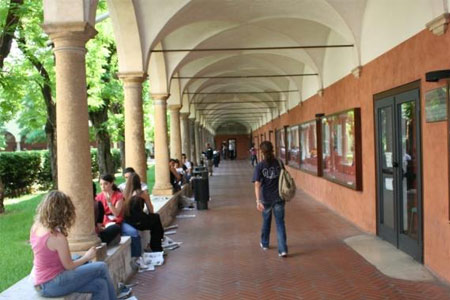- Didattica

Corsi di laurea
Corsi di laurea magistrale
POST LAUREA
- Facoltà
- Segreterie e sedi

Segreterie
Strutture
- Persone
- MY UNIVR
-
To show the organization of the course that includes this module, follow this link  Course organization
Course organization
| TERP VR 3^ ANNO - 1^ SEMESTRE |
To view lesson hours, consult click in order to view the timetable here
click in order to view the timetable here
At the end of the course, students will be able to:
• Recognize the fundamental characteristics and the evolution of the social service system in Italy, the socio-cultural paradigm that forms its base, the relationship with the practice of the profession
• Describe the type and organization of the health and social services to the person
• Grasp that the current situation is critical and thus open to the possibility of creating a new paradigm
• Exercise reflective skills regarding the link between: organization of services, user needs and practice of the profession
1. The social status in Italy and the system of services to the person
• The evolution of social politics and the system of social services: cultural-historical-legislative framework
• The subjects of programming and managements
• The regulation of the system: LEA e LIVEAS, zoning plans, accreditation
• The first signs of crisis, the third sector’s self-assertion and the welfare mix
2. What the social service offers
a) Services for minors and families
• Support in everyday life and parenthood
• Support in disadvantageous and multiproblematic situations
b) Social assistance and social health for the elderly
• When is one considered elderly; problems concerning who shoulders the responsibility
• Services supporting the period of stay in the social and family context
• Residential services
c) Services for the disabled
• How does one define “disability”: criteria and procedures for access to services
• Support for scholastic and workforce reintegration
• Economic support, diurnal services and residential services, with special reference to the seriously disabled
• What prospects for the “after us”
d) Services to combat poverty and social exclusion
• Age-old and modern-day poverty
• Disadvantageous situations: support for and prevention of social marginality; the experience of “reciprocity agreements”
• Area of serious marginality: services for social inclusion and a network approach
3. Services in high-level social and health integration
a) Mental health services
• From the psychiatric hospital to community psychiatry: Law 180/78 and subsequent evolutions
• Prevention, health care and rehabilitation services for minors and adults
b) Addiction services
• Old and new addictions
• Prevention, health care and rehabilitation services
4. The manifestation of a crisis within the system and a possible new paradigm
• Inadequacy of the system regarding economic sustainability and pertinence
• The relational and subsidiary paradigm; self-help groups amid leadership and reciprocity; the relationship between the system of formal services and informal realities
• The possible fallout in the practice of the profession; the “border-worker”
Required textbooks and references
FOR THE EXAM
Franzoni F. e Anconelli M. (2014), La rete dei servizi alla persona. Dalla normativa ai servizi alla persona, Carocci-Faber, Roma
Lecture notes and handouts
RECOMMENDED BIBLIOGRAPHY
Burgalassi M. (2007), Il welfare dei servizi alla persona in Italia, Franco Angeli, Milano
Burti L. and Guerriero E., “Psychiatric Rehabilitation. An Open-Network Orientation”, in Epidemiologia e Psichiatria Sociale, 3, 2003.
Colozzi I. e Bassi A. (2011), Da terzo settore a imprese sociali, Carocci Faber, Roma.
Donati P. (2013), Sociologia della relazione, Il Mulino, Bologna.
Ferrario P. (2014), Politiche sociali e servizi, Carocci Faber, Roma.
Ferrera M. (2006) Le politiche sociali, Il Mulino, Bologna
Folgheraiter F. (2000), L’utente che non c’è. Lavoro di rete e empowerment nei servizi alla persona, Erickson, Trento.
Folgheraiter F. (2012), Sorella crisi. La ricchezza di un welfare povero, Erickson, Trento.
Gori C. et al. (2014), Il welfare sociale in Italia. Realtà e prospettive. Carocci Faber, Roma
Guerriero E., “Servizi Psichiatrici e Privato Sociale: nuovi rapporti per nuove prospettive”, in Epidemiologia e Psichiatria Sociale, 3, 1998.
Messia F. e Venturelli C. (a cura di) (2015), Il welfare di prossimità. Partecipazione attiva, inclusione sociale e comunità, Erickson, Trento.
Rossi P. (2014), L’organizzazione dei servizi socio-assistenziali, Carocci Faber, Roma.
The examination includes an oral interview. The aim is to check to what extent the student has adopted the content of the basic text and the material provided by the teacher, if he holds a global and comprehensive view of the issues, if it is able to express reflexivity on the relationship between the contents of the module and the exercise of their professionalism. In the exhibition, the student must demonstrate that they have developed in a personal way the various topics and know how to express in their own language, avoiding mnemonic trace the texts studied.
© 2002 - 2024
Verona University
Via dell'Artigliere 8, 37129 Verona |
P. I.V.A. 01541040232 |
C. FISCALE 93009870234